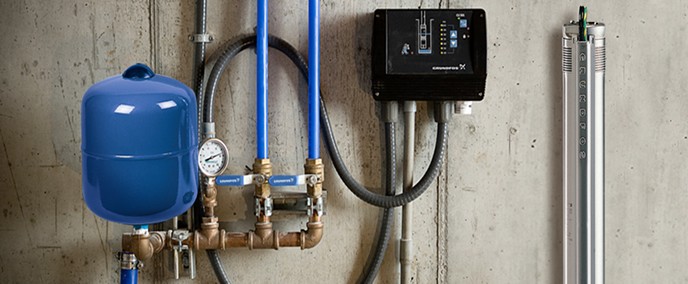Cutting-Edge Water Filtration Systems: Encouraging Healthier Living Environments
Cutting-Edge Water Filtration Systems: Encouraging Healthier Living Environments
Blog Article
Recognizing the Key Parts of Effective Water Purification Solutions

Value of Water Filtering Systems
Water purification systems play an essential function in ensuring accessibility to tidy and secure drinking water by properly eliminating contaminants and contaminations. These systems are necessary in addressing the growing issues over water high quality and the prospective health dangers related to consuming polluted water. By using various filtering systems such as reverse osmosis, triggered carbon, and UV sterilization, water filtration systems can successfully eliminate hazardous materials like bacteria, viruses, heavy steels, and chemicals from the water system.
Furthermore, water purification systems help to boost the preference and odor of water by getting rid of chlorine, sediments, and various other contaminants that can affect its high quality. Pump repairs & installation. This improvement in water top quality not only makes it more palatable but likewise urges individuals to consume an adequate amount of water daily, promoting much better hydration and total health
Types of Purification Components

Physical filters are created to physically stress out impurities from the water. These filters can be made from materials like ceramic, carbon, or even sand, and they work by trapping fragments bigger than the filter's pores as water passes through.
Chemical filters use numerous chemical procedures to get rid of contaminants from the water. Instances include turned on carbon filters, which adsorb pollutants, and reverse osmosis membrane layers, which use stress to different impurities from the water.
Biological filters use living microorganisms like microorganisms or algae to break down raw material and toxins in the water. These filters are frequently used in wastewater therapy plants or natural water filtration systems.
Comprehending the different kinds of filtering components is vital for choosing the most ideal water filtering system for particular purification needs.
Feature of Debris Filters
Debris filters play an essential role in water filtration systems by efficiently capturing solid bits suspended in the water. These filters are commonly the initial line of defense in a filtering system, getting rid of bigger particles such as sand, silt, dirt, and rust before the water relocates via finer filtration stages. By trapping these debris, the filters prevent them from getting to downstream elements, thus prolonging the lifespan and efficiency of the whole system.
Overlooking this maintenance can lead to clogging, decreased water flow, and jeopardized purification performance. Generally, debris filters are vital components that add considerably to the effectiveness of water filtration systems.
Duty of Turned On Carbon Filters
Playing an essential function in water filtration systems, triggered carbon filters are critical in eliminating contaminations and impurities from the water. These filters are designed to adsorb and catch Visit Website a wide variety of toxins, consisting of chlorine, unpredictable organic compounds (VOCs), pesticides, and herbicides. The activated carbon material has a large surface location, permitting the effective trapping of pollutants via a process called adsorption. As water passes via the filter, the turned on carbon brings in and holds onto the pollutants, ensuring that the water that appears on the other side is cleaner and safer for usage.
Turned on carbon filters are extremely reliable at enhancing the taste and smell of water by reducing chemicals that can influence its high quality. Due to their convenience and integrity, activated carbon filters are an essential element in guaranteeing that water is cleansed to the greatest standards prior to reaching consumers.
Understanding Reverse Osmosis Equipments
Reverse osmosis systems are advanced water filtering systems that employ an innovative process to remove impurities and contaminations from drinking water. These systems function by using pressure to the water, compeling it via a semi-permeable membrane. This membrane layer serves as an obstacle, enabling just pure water molecules to pass through, while obstructing larger molecules such as minerals, chemicals, and other impurities. Because of this, the water that comes out beyond is substantially cleaner and safer for consumption.
Furthermore, reverse osmosis systems are reasonably low-maintenance and can be set up under the sink or in a central filtration system, offering practical access to clean water throughout the family. On the whole, understanding just how reverse osmosis systems work can aid individuals make notified decisions regarding their water filtration needs.
Verdict
In conclusion, efficient water filtration systems are vital for ensuring risk-free and clean drinking water. The crucial parts of these systems include sediment filters, activated carbon filters, and turn around osmosis systems. By recognizing the feature and duty of each component, individuals can make enlightened decisions when selecting a More Bonuses water purification system. It is very important to prioritize the top quality of water in order to promote general health and wellness and health.
Water filtration systems play a critical duty in guaranteeing accessibility to tidy and safe drinking water by effectively eliminating impurities and contaminants. By using numerous purification systems such as reverse osmosis, triggered carbon, and UV sanitation, water explanation purification systems can efficiently eliminate dangerous materials like germs, viruses, hefty metals, and chemicals from the water supply.
Debris filters play an essential duty in water purification systems by properly recording solid particles put on hold in the water (Water Softeners).Playing a vital role in water filtration systems, turned on carbon filters are crucial in eliminating pollutants and impurities from the water supply.Reverse osmosis systems are innovative water filtration systems that use an innovative procedure to remove impurities and pollutants from alcohol consumption water
Report this page